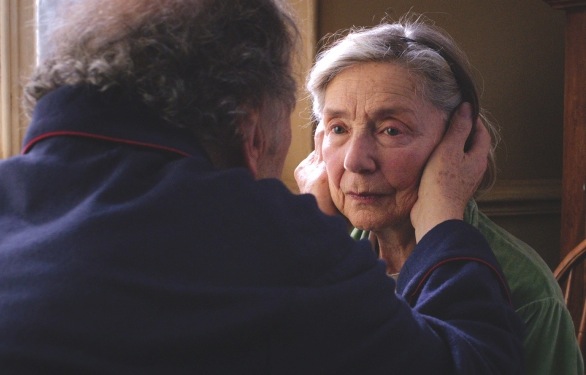By Laurie Coker
Rating: B-
I watched the critically acclaimed Amour over holiday break and afterward had an online discussion with a friend and former film critic about it and all the hype surrounding it. When he lived in Austin, our reviews of films rarely matched up. We have, at times, extremely diverse ideas about what makes a good film, but surprisingly, especially to me, we agree on Amour. This French film, from director, seventy-five-year old Munich native Michael Haneke, drones on at a depressing pace match only by the equally depressing subject matter. Haneke, who wrote the screenplay, offers a painfully realistic look at marriage, growing old and one’s obligations to another in life, love and dying.
Anne (Emmanuelle Riva) and Georges (Jean-Louis Trintignant), the protagonists of Michael Haneke’s Amour, are a courteous, educated married couple of advanced years who live in Paris in a tiny, stark flat. Anne and Georges, whose love for one another is undeniable and evident in their faces and affection toward each other, are retired classical musicians and teachers. Their grown children are musicians too. The couple has a long and deep-rooted connection to the music world. Anne, one typical morning while having breakfast, suffers a stroke, leaving her partially paralyzed and showing little hope of recovery. Without the use of her entire right side, she must rely on Georges to care for her, which he does kindly and selflessly, but as the situation worsens it wears on George.
In fairness, the story is moving, painfully so and certainly reflects the strength of undying love and affection that can exist in lifelong relationships, but the subject matter is so dismal and disheartening that watching it, I began to feel even worse and more frightened about growing old, Worse, in my case, I may do so without someone to care for me if needed. Growing old is terrifying, in spite of anything we try to tell ourselves and our efforts to delay the fact. Haneke’s film paints a distressing portrait of aging, coming to terms with the inevitable and watching, helplessly as the inescapable happens.
His cast is exceptional, both extraordinarily talented, veteran French actors, who pour themselves completely and deeply into their characters. Scenes between them never fail to evoke strong emotional reactions. When Anne comes closer and closer to her impending death, Georges must come to grips with a plethora of feelings – guilt, despondency, dismay, and yes, relief. These actors’ faces speak more clearly and agonizingly than the words they utter – in French, subtitled in English. Anne dies by degree, in stages, and painstakingly slow, and in the film, I felt like in real time.
In fairness Amour is visually remarkable, Haneke lingering on his actors for great lengths of time focusing on reading the faces. This on one hand works for him, but on the other, it makes the film feel longer than it truly is. And while the story is linear, pivotal plot point seem lost and I further felt like Haneke’s script omits vital information. More than anything, and this can be wholly attributed to personal taste, I simply did not appreciate the extensive, lengthy, droning delivery of a completely discouraging and distressing tale. Like he effectively lingers on his actors expressions, Haneke loiters on his theme and in this case, brevity might have been a far better choice.
I can see where its stars could easily and deservedly garner praise and raves, and yes, even award consideration, but the film is far too monotonous, emotionally draining and bleak for me to imagine what the clamor is about. Far too many other better films came out last year to warrant this one landing on top of best picture lists. Yes, it is good, yes the cast is beyond amazing, but no, it is not the stuff of legend. I am placing a B- in my grade book. I will give Haneke his due in some aspects, but not in story. He is much older than I, and has perhaps a far bleaker view of aging, but the terms excruciatingly heart-breaking only touch lightly on describing his film.
